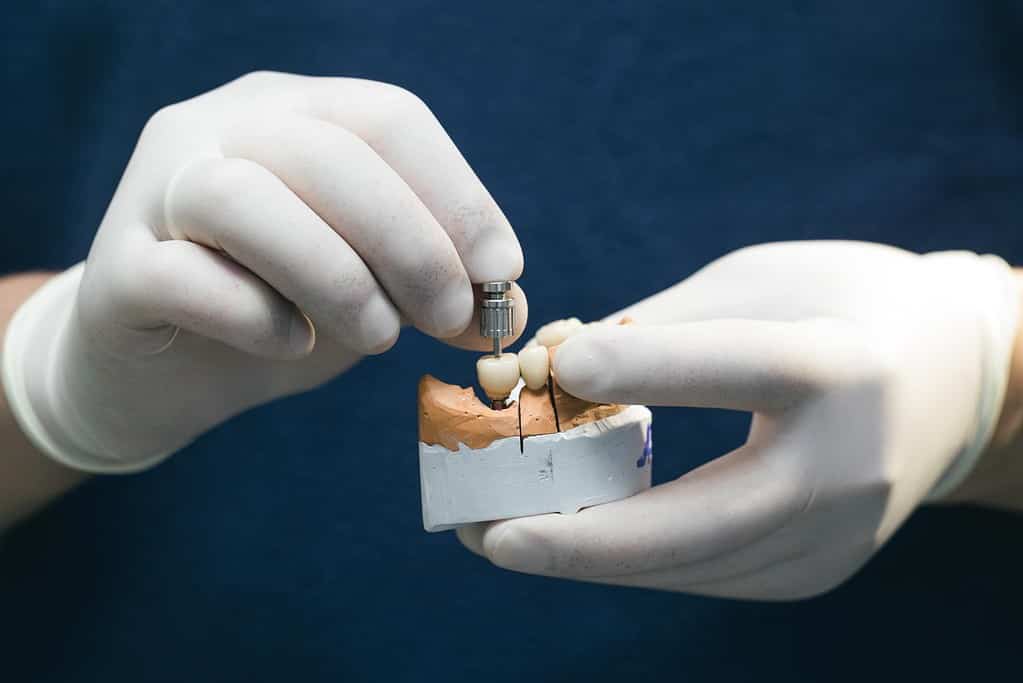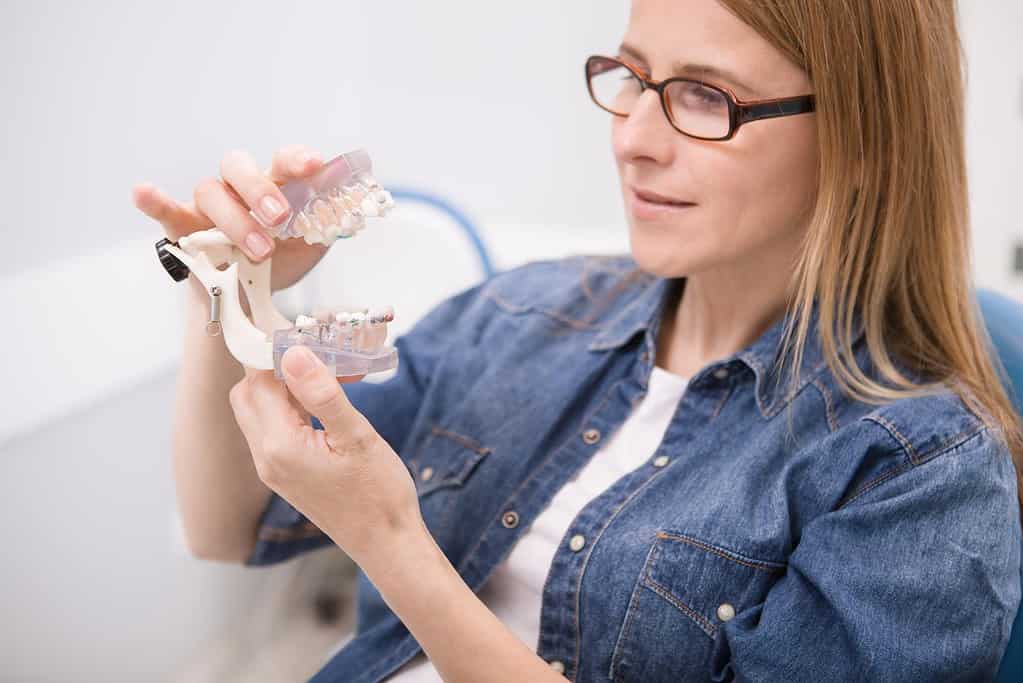Are you considering dental implants for tooth loss? It’s a big decision, and understanding the connection between dental implants and your overall dental health is crucial.
Imagine a solution that not only enhances your smile but also boosts your oral well-being. That’s exactly what dental implants offer, bridging the gap between aesthetics and health.
So, in this article, we’ll explore the vital link between implants and oral health, shedding light on how this innovative treatment can be a game-changer for you. Just keep reading!
What Are Dental Implants?
Dental implants are a state-of-the-art solution for replacing missing teeth, offering a durable and natural-looking alternative.
They are simply artificial tooth roots, typically made of titanium, that are placed into your jawbone. Over time, they fuse with your bone, providing a sturdy foundation for artificial teeth, known as crowns.
How Do They Work?
The implants function by mimicking the root of a natural tooth, anchoring securely into the jawbone to provide a stable base for artificial teeth.
The implant procedure begins with the implant, a titanium post, being surgically placed into the jawbone. Over a period, typically a few months, the implant integrates with the bone in a process known as osseointegration, creating a solid foundation.
Once this fusion is complete, a connector, known as an abutment, is attached to the implant to hold the new tooth or teeth in place.
This method ensures that the dental implants are not only aesthetically pleasing but also fully functional, allowing for normal eating, speaking, and smiling without the worries associated with traditional dentures.
How Dental Implants Improve Oral Health
Dental implants play an important role when it comes to maintaining and enhancing dental health. From supporting your gums to fortifying your jaw, this innovative dental solution has redefined the art of restoring smiles.
Let’s quickly see the link between these two. We are sure that will help you make an informed decision concerning your smile!
#1: Prevents Bone Loss
When you lose teeth, you also lose bone mass in your jaw. Dental implants stimulate the jawbone, mimicking the root of a natural tooth and preventing bone loss, ensuring the structural integrity of your jaw remains intact.
#2: Keeps Your Mouth Clean and Healthy
Unlike bridges or dentures, which can be challenging to clean around, hence trapping food particles and bacteria, dental implants act like normal teeth, making it easier to maintain good oral hygiene and reduce the risk of oral disease.
#3: Take Care of How Your Face Looks
Missing teeth can lead to facial sagging over time. But implants help maintain your facial structure, preventing the jaw bone from deteriorating and keeping your face looking fuller and younger.
#4: Preservation of Adjacent Teeth
With traditional bridges, adjacent teeth need to be filed down to support the bridge. Implants eliminate this need, allowing your real teeth to remain untouched and healthier for longer.
#5: Enhanced Chewing Function
With the strong foundation that implants provide, they restore nearly the same chewing force as your usual teeth. This allows you to eat a wider variety of foods, which can contribute to better overall nutrition.
#6: Make Your Smile Look Better
Beyond the functional benefits, dental implants offer a cosmetic advantage. They fill in gaps, leading to a more complete and confident smile, which can have significant positive effects on your self-esteem and social interactions.
How Dental Implants Help Your Gums?
#7: Make Your Jawline Stronger
Dental implants integrate with the bone, providing stimulation that helps maintain the jaw bone’s density and strength. This not only supports your gums but also contributes to a more robust and defined jawline.
#8: Give Support to Your Mouth
Implants offer a stable foundation for artificial teeth, which helps distribute biting forces evenly across the mouth. This reduces stress on the gums and surrounding teeth, promoting healthier gums and preventing the issues that come with overworked oral tissues.
Who Can Get It?
Dental implants are suitable for most adults with good general health and sufficient jawbone to support the implant. Ideal candidates are those missing one or more teeth who want a durable and long-lasting solution.
However, they’re not recommended for children and young teens whose jaw bones are still developing. Smokers and individuals with certain medical conditions, such as uncontrolled diabetes or heart disease, may need additional evaluation to determine their suitability for this procedure.
What Are the Risk Factors of Dental Implants?
While dental implants have a high success rate, there are some risk factors to consider, such as the potential for implant failure, infection at the implant site, nerve damage resulting in pain or numbness, and sinus issues if implants placed in the upper jaw protrude into sinus cavities.
Proper planning and post-procedure care can significantly mitigate these risks, but it’s crucial for patients to discuss their medical history and lifestyle habits with their dentist to assess any specific risks they might face.
Caring for Dental Implants
Caring for dental implants involves maintaining good oral hygiene practices similar to those for natural teeth. This includes regular brushing twice a day, flossing daily, and using an antibacterial mouthwash to prevent infection.
While implants are not susceptible to decay like normal teeth, the health of the surrounding teeth is vital to their longevity.
It’s also important to visit your dentist regularly for check-ups and professional cleanings. This is to ensure that the implants and surrounding gums remain healthy.
Avoiding hard and sticky foods can also help protect the implants from damage. With proper care, your implants can last for many years, functioning effectively and enhancing your overall mouth health.
Transform Your Smile with Confidence at Pall Mall Dental Clinic
Don’t wait to revitalise your smile and boost your oral health! At Pall Mall Dental Clinic, we specialise in providing top-notch dental implant services, using state-of-the-art technology and techniques to ensure you get the best results.
Our experienced team is dedicated to creating a comfortable, welcoming environment where your care is our priority.
Whether you’re looking to replace a single tooth or require a more comprehensive solution, we’re here to guide you every step of the way.
Book your appointment with us today and take the first step towards a brighter, healthier smile that will last a lifetime.
Call us on 0151 258 1968 now to begin the journey to your dream smile!
FAQs
Can you get dental implants if you have gum disease?
It’s crucial to treat any oral disease before proceeding with dental implants. Implants require a healthy, stable foundation, and untreated gum disease can jeopardize the success of the implant.
Contact us now to assess and treat any gum issues first to ensure the gums are healthy enough to support the implants.
Why is dental care important for overall health?
That’s because good oral health is interconnected with the body’s overall well-being. Poor dental hygiene can lead to dental issues like cavities and gum disease and has been linked to heart disease, diabetes, and stroke. Maintaining oral health helps prevent these conditions and contributes to a better quality of life.
Do implants require special maintenance?
Tooth implants don’t require special maintenance beyond good oral hygiene practices, which include regular brushing, flossing, and dental check-ups.
Are dental implants painful?
The process of getting dental implants involves a surgical procedure, which can be associated with some discomfort.
However, most patients report that the discomfort is less than they expected, and it can usually be managed with over-the-counter pain relief medication. Local anaesthesia and, in some cases, sedation are used during the procedure to minimize pain.
Do they look like normal teeth?
Yes, they are designed to look, feel, and function like normal teeth. The visible part of the implant, the crown, is specially crafted to match the colour, shape, and size of your surrounding teeth. This ensures a natural-looking and aesthetically pleasing result.




